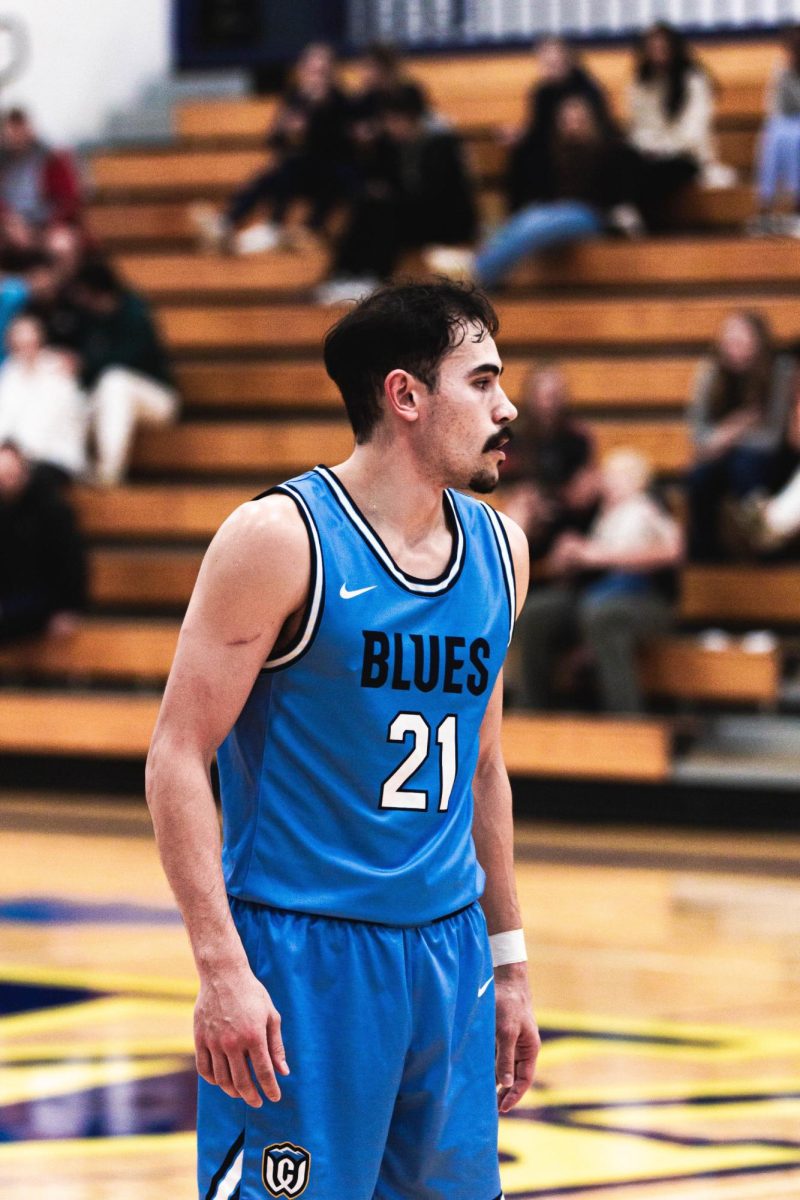Despite being a common identity, the idea of what makes a person an athlete is nebulous. One could argue it has to do with competition, others could say the goals and others might claim it’s the team environment. What makes the concept of athlete even more interesting is the fact that it often shapes unrelated facets of life; it can define friend groups, free time and academics. Plus, one’s identity as an athlete changes over time, whether it be moving to a new place, changing sports or teams, injuries or transitioning out of athletics entirely.
To begin to piece through these ideas, I spoke to seven athletes, all of them engaged in different sports and in different stages of their athletic career. We started at the beginning, exploring how they first got involved in sports. For many interviewees, family was the deciding factor.
Senior Gabe Wasserman recounted how his father used to run races with him as a toddler.
“I like to tell people I won a bunch of races when I was two years old because I’d be in the stroller right in front of him,” Wasserman said.
This grew into Wasserman’s own love for cross country, and he continues to run for Whitman. Senior Chaney Heinbaugh recounted a similar origin story to her soccer career. Her father and brothers played soccer, and the same came true for Heinbaugh.
“I’ve played soccer my whole life, as soon as I could dribble,” Heinbaugh said.
The family can be a huge driver behind sports enrollment at a young age, but others find their way to sports in different ways and at different times. For example, Senior Michael Culbert didn’t start rowing until the summer before high school. However, once he began, the sport took over his life until he stopped rowing when the COVID-19 pandemic hit.
“I was a chronic couch potato,” Culbert said. “[It’s] kind of weird that I was so smitten by a sport when historically I had not really enjoyed sports. But it was the people. It’s always the people.”
The community that Culbert found in rowing kept him engaged and excited about the sport, despite its demanding nature. For his crew team, he practiced three and a half hours every day, with an extra practice on Saturday. Crew became everything.
“I was the kid who would sit alone and eat lunch and do homework while eating lunch because rowing didn’t give a lot of time for homework,” Culbert said.
As Culbert found, sports can often become all-consuming. Other interviewees agreed, although specific experiences varied.
Junior Aaron Friedrich is on the Whitman Swim Team and spoke about his time with the sport.
“It’s been my life. There were little parts where I took a little break to do some other sport, but swimming [has] got an iron grip on most people who swim,” Friedrich said.
Friedrich described how, during his 17 years as a swimmer, he missed school for swim meets and had to pass up on social events with friends for practice. He has mixed feelings about this; while he wishes he could have participated in more social activities, he has also found a strong community through swimming, especially at Whitman.
Senior Jander Cline also discussed the time commitment of basketball.
“As an athlete, I put in work hours and I don’t see a paycheck. I see growth and improvement with my sport. It’s something you commit yourself to for various reasons. For fun, to be with a team, to have people to call your brothers and family,” Cline said.
Many Whitman student-athletes dedicate 25 hours (or more) to their sport every week. This makes that sport a major aspect of their college experience and requires a certain passion and dedication.
This is another reason why sports are so consuming: in order to reap the full rewards, you have to put in the work.
“I always got out of [basketball] however much I wanted to put in. Ever since I started putting in a lot more hours and work with body, mind and spirit, I’ve gotten full reciprocation from it,” Cline said.
Full commitment can lead to success and contentment within a sport. However, the intensity of sports is not always positive. When an athletic environment grows toxic, it can be harmful to those involved.
For example, the pressure to constantly push yourself, reach a peak physique and level of fitness and always better your times and performances can manifest in negative ways. Culbert talked about this experience in relation to team workouts.
“It wasn’t irregular for a quarter or half of the room to vomit after a hard workout. You get pretty used to it after a while of vomiting after a workout,” Culbert said.
This caused problems down the line when the idea of vomiting after working out became the norm, and when it didn’t happen, Culbert worried that the workout wasn’t hard enough.
Other interviewees brought up the intense pressure that comes with being an athlete as well; Senior Ally Kim talked about struggling with her mindset in cross country.
“In high school, if I had a good race I would feel great, and if I didn’t it would set the tone for other things in my life. It would be upsetting and I would be really hard on myself,” Kim said.
Wasserman also emphasized the vulnerability that athletes have to mental pressures.
“Being an athlete is a really special experience, and it comes with a lot of stress and anxiety for people. I think that’s connected with eating.”
The focus on physical performance can lend itself to harmful conceptions of food and exercise. Mix that with the pressure cooker of having to always strive to improve, whether it be beating a time you set in the last meet or winning another game, and you have a recipe for burn-out.
However, interviewees emphasized how these problems are not a given; rather, they are often products of toxic environments.
For example, Junior Cleopatra Nabyonga emphasized the fine line between challenging yourself and exhausting yourself.
“It’s always about pushing yourself to – not extreme, because a lot of times when people hear pushing yourself, they believe that it means taking yourself all the way down and exhausting yourself – but challenging your mindset,” Nabyonga said.
If you approach sports with a growth mindset and play in a positive team environment, harmful pressures become less present and athletes can thrive as a part of a larger community.
In fact, Nabyonga’s story with sports reveals how she was able to overcome a toxic environment and come out the other side stronger. She faced pushback from her father when she started playing soccer because he believed that women shouldn’t play. However, she stuck with soccer, battling the idea that women weren’t good at athletics. In doing so, she found power in athletics. Plus, it simply brings her joy, despite outside challenges.
“I love moving because it increases my dopamine levels and my serotonin, so I’m more smiley throughout the day,” Nabyonga said. Going back to the basics of athletics, movement can reconnect athletes to the initial love they developed for the sport.
The stories that interviewees shared speak to the constantly changing nature of being an athlete. Many of them have experienced both positive and negative environments. In each space, they developed certain mindsets and relationships with their sport, creating a complex and shifting identity.
Both Friedrich and Kim participated in teams in high school that fostered negative mindsets. This caused problems, whether it be tension between team members due to comparisons by the coach or negative self-talk. However, Friedrich and Kim reported finding a healthier community at Whitman and have re-developed positive relationships with their sports.
“[Whitman cross country] is definitely making me appreciate what a sport is intended to do for the soul,” Kim said. “I’m learning to appreciate it more.”
Culbert has experienced a similar transition. After a difficult exit from rowing that left him feeling like he had lost a core aspect of his identity, he has slowly started to change his mindset and reconnect with new sports.
“As my relationship with sports and athletics has changed in a more positive way – in an, ‘I’m here to have fun, and if I’m not having fun, I’m not doing it’ way – sports still has a place in my life, and will indefinitely, ” Culbert said.
The athlete experience is complex and changes over time. This makes it hard to define the word. I asked interviewees what makes someone an athlete, and answers varied.
One common pattern was the idea of community.
“I’d say [being an athlete is] connection, family and purpose,” Friedrich said. “That’s a thing that helps me stay focused and stay on the path. I know that I have 19 other guys around me, plus 20 other girls around me that I’m swimming for every single day.”
Kim shared a similar sentiment.
“I’ve learned over time that my identity [as an athlete] has opened up to being involved and learning from other people alongside other people in addition to being about me,” Kim said.
Heinbaugh also spoke about community, and then built on that idea, adding the concept of resilience to the definition.
“Being an athlete means being able to thrive on a team, being able to work with others, being able to have that tenacity and that belief in yourself,” Heinbaugh said. “To be an athlete and to have continued into the collegiate level, you’ve definitely gone through trials. It cannot have been all rosy and sunshine.”
More definitions emerged in the interviews. Culbert suggested that being an athlete “is defining yourself in some small part by a sport and a pursuit to be better at that sport.”
Kim also brought up the role of having goals. “I think it does involve some goal in mind. That goal could be as concrete as getting a time, or in softer terms of feeling better in [your] body or having something to chase after.”
Another idea centered around passion. “I think at the end of the day, it’s about being passionate. I think it’s about being really connected with your mental health and your physical health,” Wasserman said.
As these snippets show, we can define ‘athlete’ in numerous ways. One’s personal experience as an athlete often determines how one will define the concept. Maybe, when there are already so many pressures in the sports realm, the best thing to do as an athlete is simply be. If you want to be an athlete, go for it. You can define it in your own way, and it can be an incredibly rewarding aspect of your identity.
Of course, there are also dangers to be aware of and slippery slopes to be avoided. Being an athlete, especially if the environment turns toxic, can morph into something painful and draining.
If this happens, there’s always a solution, whether it be taking a break, connecting with mental health services, focusing on social connections or only participating when athletics feel fun. When done right, sports can be a haven, allowing individuals to construct their own identities and roles in the world of athletics.










